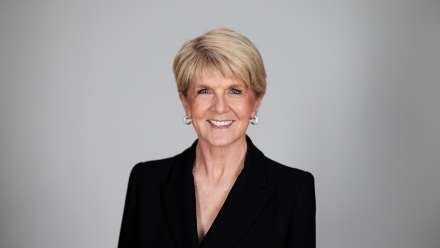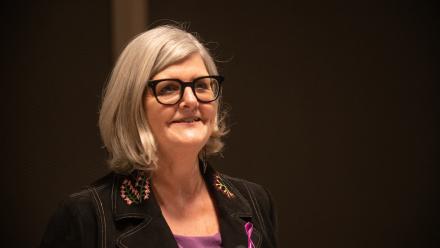Kindred spirits
A research project on Christianity in the Pacific is revealing just how much of the human spirit is common to both the West and Oceania. By JAMES GIGGACHER.
In the 1970s, as a young anthropology student, an excited Margaret Jolly shipped from Australian shores to the island of Pentecost in Vanuatu.
There, she embedded herself in the traditional kastom communities of Bunlap and Porur in the island's south. According to Jolly, these people were famed "for their resistance to Christianity, capitalism and the colonial government", as well as for gol - a ritual dive made from dizzying heights (and the inspiration for modern-day bungee jumping).
Almost 40 years later, Jolly, who is now a professor at the ANU College of Asia and the Pacific, has gone back to the island. As an Australian Research Council Laureate Fellow she is leading a five-year project examining gender, Christianity and commodities across the Pacific.
"Christianity has been in the Pacific since the late 18th century," says Jolly.
Nowadays, about 98 per cent of Pacific Islanders are members of a Christian denomination.
For Jolly, scholarship on Christianity is crucial to informing better public policy - particularly when it comes to one
of the most fundamental of collective and individual rights: gender equality.
"I think that the 19th century missionaries' message of Christianity was really important in terms of the idea of improving women's status in this part of the world," she says.
"Contemporary ideas about gender equality, which are often linked up with global models of human rights, are articulating, or 'hooking up' if you like, with those very Christian ideas of improving women's status.
"Those Christian ideas are probably more significant to most women than more secular ideas of improvement."
But it can cut both ways. Across many parts of Oceania, violence against women is "expected and accepted", says Jolly.
And too often this violence is justified using Christian ideals.
"I think that in terms of opposing gender violence, Christianity can be a mixed blessing," says Jolly.
"Clearly, all the ideas about peace and harmony, and equality between men and women that are one part of the Christian message can work to redress patterns of violence.
"But on the other hand you also have some people espousing those parts of the Bible where the Christian message is about the husband as the head of the family, and using the Bible to legitimise not only violence of husbands against wives, but parents against children."
There is still much to be done if Pacific Islanders are to enjoy rights similar to those enjoyed by us living in Australia. But this is another aspect of our relationship with the region that Jolly critiques - she suggests that too often when people look at the Pacific they see it in terms of 'us' and 'them'.
"I am quite allergic to these ideas about us and them; these binaries that situate Pacific people as the opposite of the West," she says.
"I am much more interested in models of humanity which are about what we share as human beings; about relations, and about historical connections.
"We should not associate universal ideals and values just with the West. And we actually have to see, particularly in the contemporary era of globalisation, that there are lots of ideas about the whole world that are coming from places other than from the United Nations in New York.
"Ideas of what we share as human beings are very powerfully articulated by Pacific women for example, but they are not heard as universals because they are seen to be coming from relatively remote and powerless places."
Upon her recent return to South Pentecost, Jolly started humming the melody of Bob Dylan's All the Tired Horses. She was instantly greeted by a chorus of women crooning the same ballad, but the lyrics had been changed to their own language, Sa.
"You remembered the song," said Jolly, delighted.
"Of course we did, Margaret...it's your song," they replied. But they had also made it theirs.
It just goes to show that if we all learn to sing from the same score, albeit in our own way, we can make some truly meaningful connections.
Amen to that.
This article appeared in ANU Reporter magazine Autumn 2014. Subscribe for free now.


